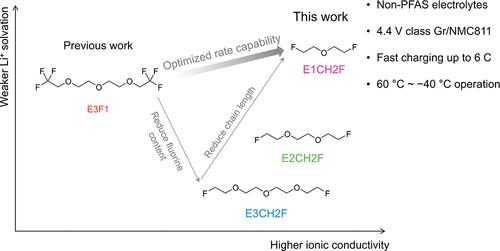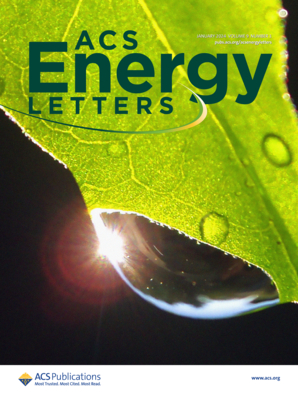Molecular Structure Optimization of Fluorinated Ether Electrolyte for All Temperature Fast Charging Lithium-Ion Battery
IF 19.3
1区 材料科学
Q1 CHEMISTRY, PHYSICAL
引用次数: 0
Abstract
New electrolytes are needed to replace commercial carbonate electrolytes to enable a wider working temperature range, higher energy density, and faster charging of lithium-ion batteries (LIBs). Fluorinated diluents and solvents have shown promise in LIB electrolyte design, but most of them are considered per- and polyfluoroalkyl substances (PFAS) with significant environmental and health concerns. In this work, we design a family of non-PFAS, partially fluorinated ether solvents for LIB electrolytes. Through rational molecular design, an optimized rate capability is achieved by low viscosity, weak lithium-ion solvation, and high ion diffusivity. The optimized electrolytes enable a longer cycle life and better rate capability (up to 6 C) than previously reported fluorinated ethers or commercial carbonate electrolyte in graphite/LiNi0.8Mn0.1Co0.1O2 (Gr/NMC811) full cells. In addition, they also show an extended working temperature window with stable long-term cycling from 60 to −40 °C. This work shows a promising path to next generation batteries capable of extreme conditions without introducing PFAS concerns.

求助全文
约1分钟内获得全文
求助全文
来源期刊

ACS Energy Letters
Energy-Renewable Energy, Sustainability and the Environment
CiteScore
31.20
自引率
5.00%
发文量
469
审稿时长
1 months
期刊介绍:
ACS Energy Letters is a monthly journal that publishes papers reporting new scientific advances in energy research. The journal focuses on topics that are of interest to scientists working in the fundamental and applied sciences. Rapid publication is a central criterion for acceptance, and the journal is known for its quick publication times, with an average of 4-6 weeks from submission to web publication in As Soon As Publishable format.
ACS Energy Letters is ranked as the number one journal in the Web of Science Electrochemistry category. It also ranks within the top 10 journals for Physical Chemistry, Energy & Fuels, and Nanoscience & Nanotechnology.
The journal offers several types of articles, including Letters, Energy Express, Perspectives, Reviews, Editorials, Viewpoints and Energy Focus. Additionally, authors have the option to submit videos that summarize or support the information presented in a Perspective or Review article, which can be highlighted on the journal's website. ACS Energy Letters is abstracted and indexed in Chemical Abstracts Service/SciFinder, EBSCO-summon, PubMed, Web of Science, Scopus and Portico.
 求助内容:
求助内容: 应助结果提醒方式:
应助结果提醒方式:


